Retail HRM: Exploring Compensation and Benefits at Iceland Foods Ltd.
VerifiedAdded on 2023/06/13
|21
|6110
|301
Report
AI Summary
This research project investigates the importance of compensation and benefits within Human Resource Management (HRM) in the UK retail industry, specifically focusing on Iceland Foods Ltd. The report aims to identify the significance of compensation and benefits on employee retention, exploring the types of compensation offered, their impact on retention and business performance, and the challenges faced by Iceland in selecting benefits. Utilizing a quantitative research methodology with primary data collected through questionnaires and analyzed using descriptive statistics, the study adopts a positivism philosophy and deductive reasoning approach. The literature review covers the importance of compensation and benefits in attracting and retaining talent, the types of compensation offered by Iceland (including hourly wages, restaurant access, gym memberships, and pension schemes), the impact of compensation on employee retention and organizational productivity, and the challenges Iceland faces in managing compensation due to inconsistent work rates and a traditional outlook on non-monetary benefits. The research concludes with recommendations for improving compensation and benefits strategies to enhance employee satisfaction and retention within Iceland.
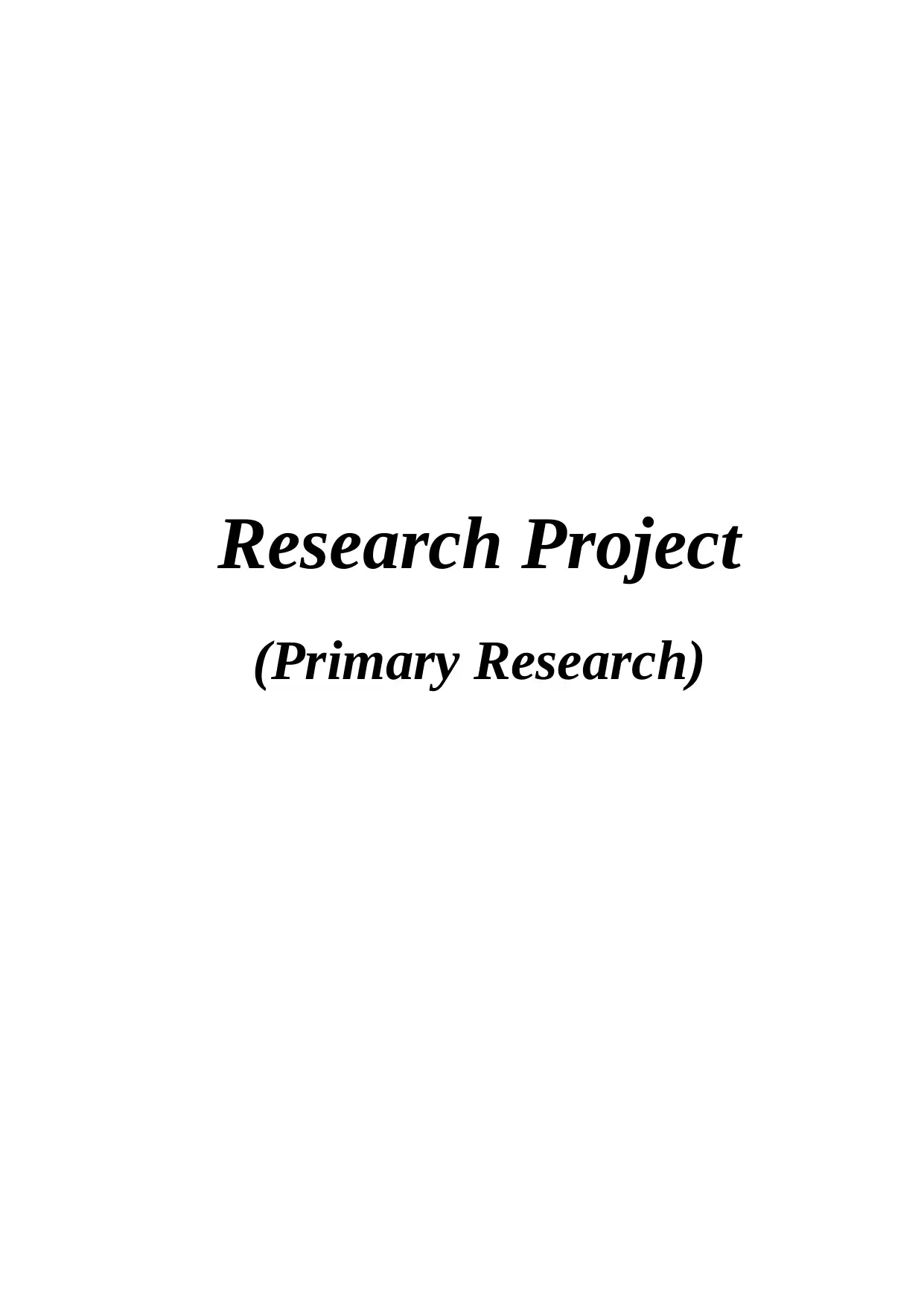
Research Project
(Primary Research)
(Primary Research)
Paraphrase This Document
Need a fresh take? Get an instant paraphrase of this document with our AI Paraphraser
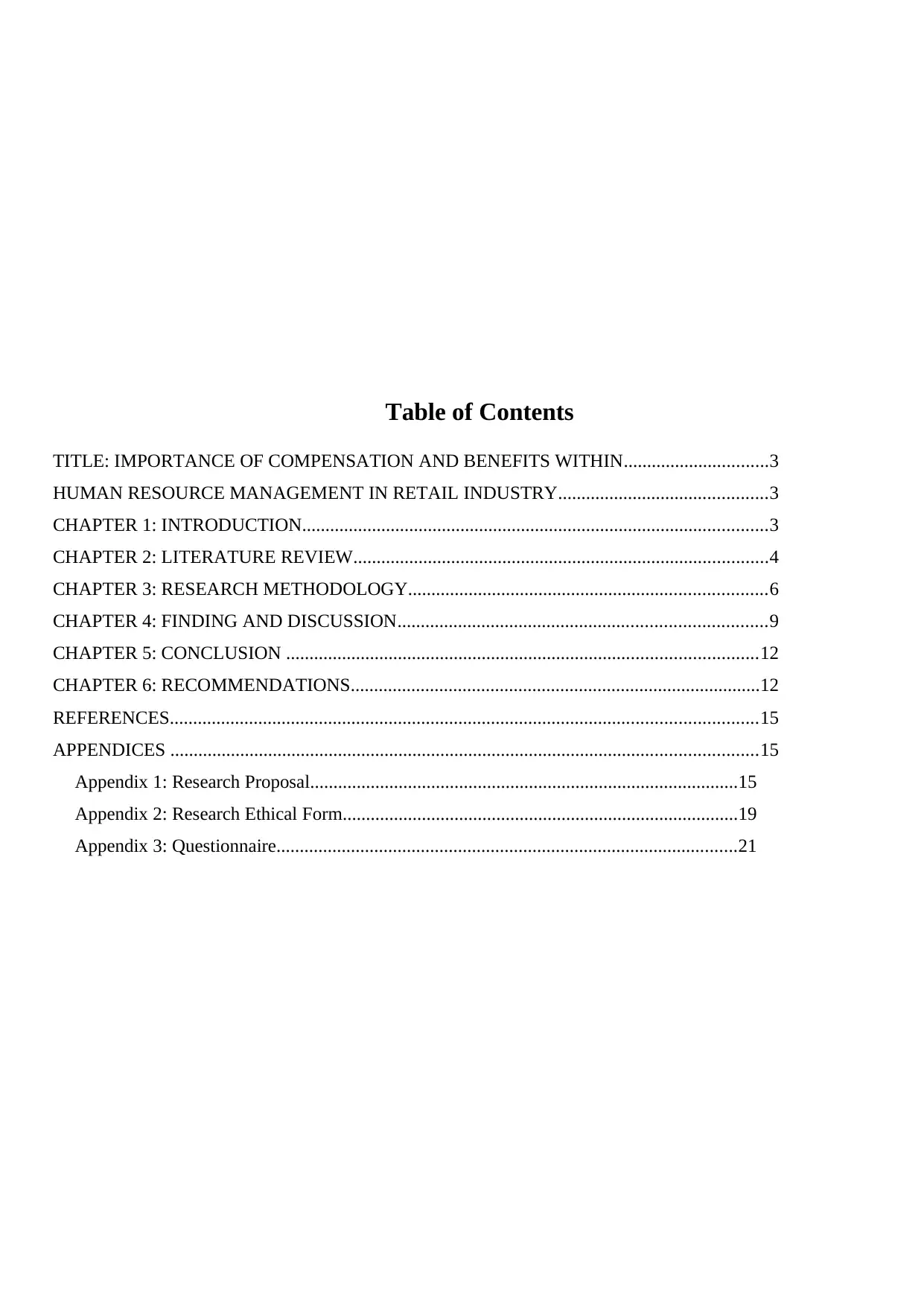
Table of Contents
TITLE: IMPORTANCE OF COMPENSATION AND BENEFITS WITHIN...............................3
HUMAN RESOURCE MANAGEMENT IN RETAIL INDUSTRY.............................................3
CHAPTER 1: INTRODUCTION....................................................................................................3
CHAPTER 2: LITERATURE REVIEW.........................................................................................4
CHAPTER 3: RESEARCH METHODOLOGY.............................................................................6
CHAPTER 4: FINDING AND DISCUSSION...............................................................................9
CHAPTER 5: CONCLUSION .....................................................................................................12
CHAPTER 6: RECOMMENDATIONS........................................................................................12
REFERENCES..............................................................................................................................15
APPENDICES ..............................................................................................................................15
Appendix 1: Research Proposal............................................................................................15
Appendix 2: Research Ethical Form.....................................................................................19
Appendix 3: Questionnaire...................................................................................................21
TITLE: IMPORTANCE OF COMPENSATION AND BENEFITS WITHIN...............................3
HUMAN RESOURCE MANAGEMENT IN RETAIL INDUSTRY.............................................3
CHAPTER 1: INTRODUCTION....................................................................................................3
CHAPTER 2: LITERATURE REVIEW.........................................................................................4
CHAPTER 3: RESEARCH METHODOLOGY.............................................................................6
CHAPTER 4: FINDING AND DISCUSSION...............................................................................9
CHAPTER 5: CONCLUSION .....................................................................................................12
CHAPTER 6: RECOMMENDATIONS........................................................................................12
REFERENCES..............................................................................................................................15
APPENDICES ..............................................................................................................................15
Appendix 1: Research Proposal............................................................................................15
Appendix 2: Research Ethical Form.....................................................................................19
Appendix 3: Questionnaire...................................................................................................21
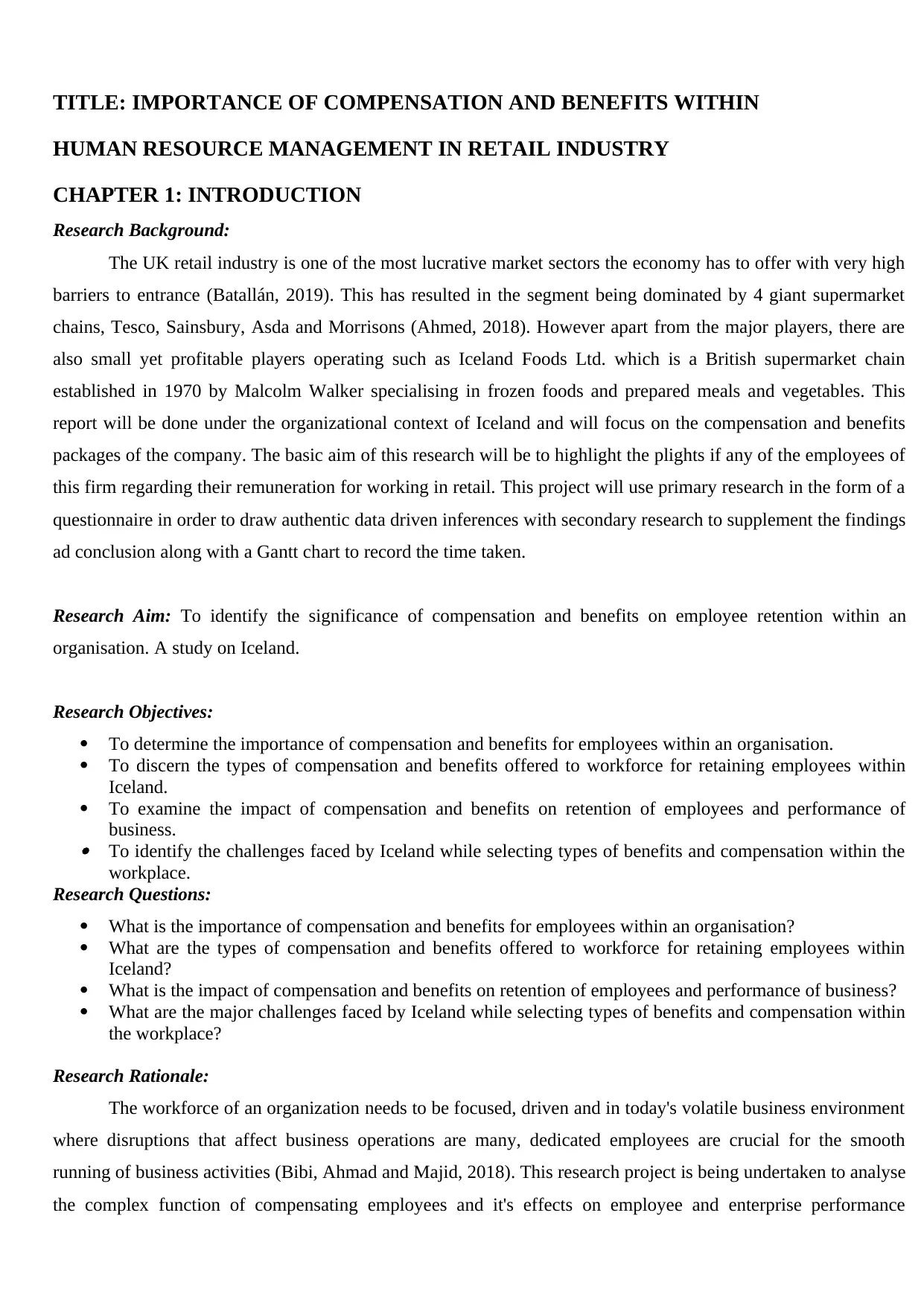
TITLE: IMPORTANCE OF COMPENSATION AND BENEFITS WITHIN
HUMAN RESOURCE MANAGEMENT IN RETAIL INDUSTRY
CHAPTER 1: INTRODUCTION
Research Background:
The UK retail industry is one of the most lucrative market sectors the economy has to offer with very high
barriers to entrance (Batallán, 2019). This has resulted in the segment being dominated by 4 giant supermarket
chains, Tesco, Sainsbury, Asda and Morrisons (Ahmed, 2018). However apart from the major players, there are
also small yet profitable players operating such as Iceland Foods Ltd. which is a British supermarket chain
established in 1970 by Malcolm Walker specialising in frozen foods and prepared meals and vegetables. This
report will be done under the organizational context of Iceland and will focus on the compensation and benefits
packages of the company. The basic aim of this research will be to highlight the plights if any of the employees of
this firm regarding their remuneration for working in retail. This project will use primary research in the form of a
questionnaire in order to draw authentic data driven inferences with secondary research to supplement the findings
ad conclusion along with a Gantt chart to record the time taken.
Research Aim: To identify the significance of compensation and benefits on employee retention within an
organisation. A study on Iceland.
Research Objectives:
To determine the importance of compensation and benefits for employees within an organisation.
To discern the types of compensation and benefits offered to workforce for retaining employees within
Iceland.
To examine the impact of compensation and benefits on retention of employees and performance of
business. To identify the challenges faced by Iceland while selecting types of benefits and compensation within the
workplace.
Research Questions:
What is the importance of compensation and benefits for employees within an organisation?
What are the types of compensation and benefits offered to workforce for retaining employees within
Iceland?
What is the impact of compensation and benefits on retention of employees and performance of business?
What are the major challenges faced by Iceland while selecting types of benefits and compensation within
the workplace?
Research Rationale:
The workforce of an organization needs to be focused, driven and in today's volatile business environment
where disruptions that affect business operations are many, dedicated employees are crucial for the smooth
running of business activities (Bibi, Ahmad and Majid, 2018). This research project is being undertaken to analyse
the complex function of compensating employees and it's effects on employee and enterprise performance
HUMAN RESOURCE MANAGEMENT IN RETAIL INDUSTRY
CHAPTER 1: INTRODUCTION
Research Background:
The UK retail industry is one of the most lucrative market sectors the economy has to offer with very high
barriers to entrance (Batallán, 2019). This has resulted in the segment being dominated by 4 giant supermarket
chains, Tesco, Sainsbury, Asda and Morrisons (Ahmed, 2018). However apart from the major players, there are
also small yet profitable players operating such as Iceland Foods Ltd. which is a British supermarket chain
established in 1970 by Malcolm Walker specialising in frozen foods and prepared meals and vegetables. This
report will be done under the organizational context of Iceland and will focus on the compensation and benefits
packages of the company. The basic aim of this research will be to highlight the plights if any of the employees of
this firm regarding their remuneration for working in retail. This project will use primary research in the form of a
questionnaire in order to draw authentic data driven inferences with secondary research to supplement the findings
ad conclusion along with a Gantt chart to record the time taken.
Research Aim: To identify the significance of compensation and benefits on employee retention within an
organisation. A study on Iceland.
Research Objectives:
To determine the importance of compensation and benefits for employees within an organisation.
To discern the types of compensation and benefits offered to workforce for retaining employees within
Iceland.
To examine the impact of compensation and benefits on retention of employees and performance of
business. To identify the challenges faced by Iceland while selecting types of benefits and compensation within the
workplace.
Research Questions:
What is the importance of compensation and benefits for employees within an organisation?
What are the types of compensation and benefits offered to workforce for retaining employees within
Iceland?
What is the impact of compensation and benefits on retention of employees and performance of business?
What are the major challenges faced by Iceland while selecting types of benefits and compensation within
the workplace?
Research Rationale:
The workforce of an organization needs to be focused, driven and in today's volatile business environment
where disruptions that affect business operations are many, dedicated employees are crucial for the smooth
running of business activities (Bibi, Ahmad and Majid, 2018). This research project is being undertaken to analyse
the complex function of compensating employees and it's effects on employee and enterprise performance
⊘ This is a preview!⊘
Do you want full access?
Subscribe today to unlock all pages.

Trusted by 1+ million students worldwide
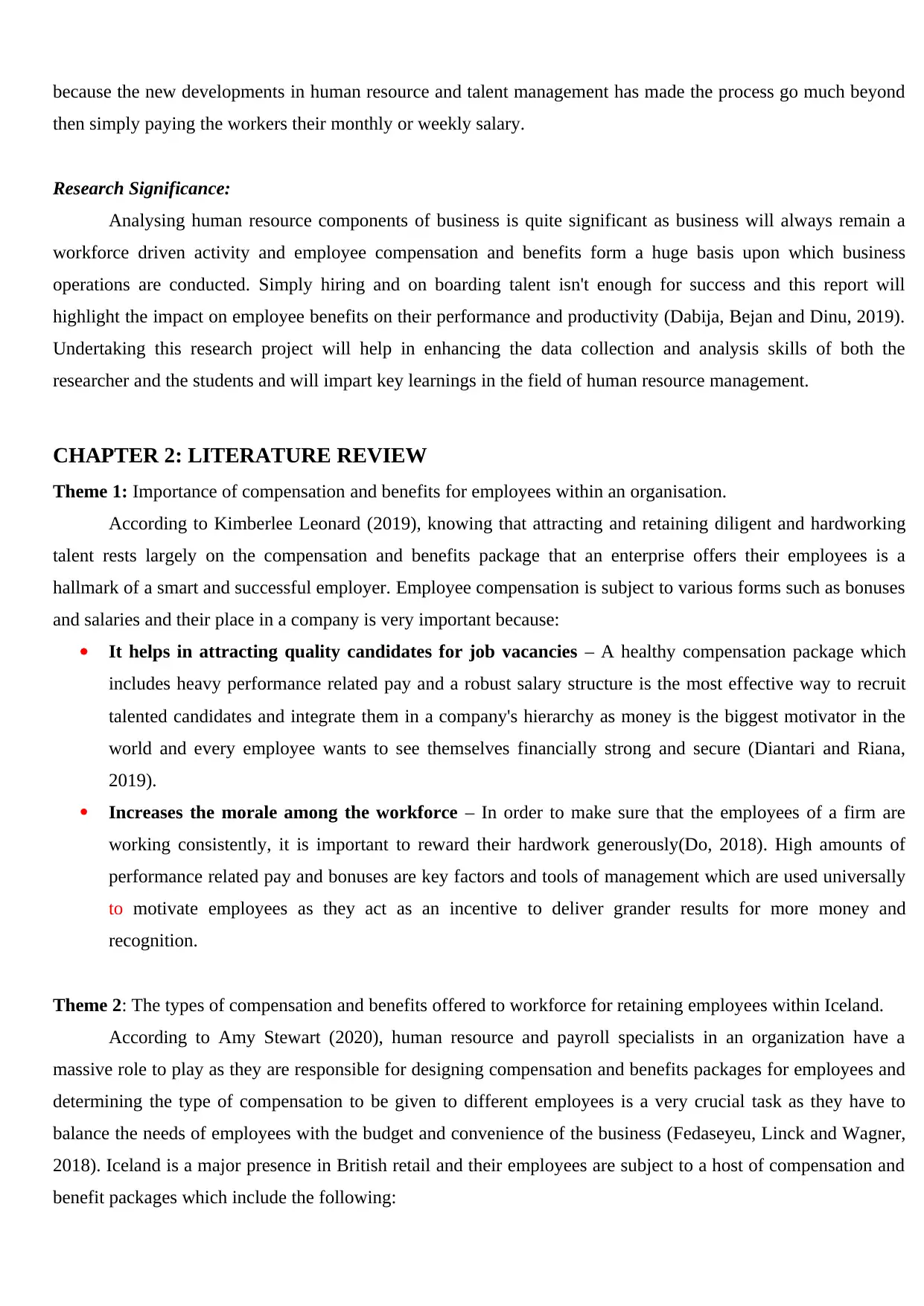
because the new developments in human resource and talent management has made the process go much beyond
then simply paying the workers their monthly or weekly salary.
Research Significance:
Analysing human resource components of business is quite significant as business will always remain a
workforce driven activity and employee compensation and benefits form a huge basis upon which business
operations are conducted. Simply hiring and on boarding talent isn't enough for success and this report will
highlight the impact on employee benefits on their performance and productivity (Dabija, Bejan and Dinu, 2019).
Undertaking this research project will help in enhancing the data collection and analysis skills of both the
researcher and the students and will impart key learnings in the field of human resource management.
CHAPTER 2: LITERATURE REVIEW
Theme 1: Importance of compensation and benefits for employees within an organisation.
According to Kimberlee Leonard (2019), knowing that attracting and retaining diligent and hardworking
talent rests largely on the compensation and benefits package that an enterprise offers their employees is a
hallmark of a smart and successful employer. Employee compensation is subject to various forms such as bonuses
and salaries and their place in a company is very important because:
It helps in attracting quality candidates for job vacancies – A healthy compensation package which
includes heavy performance related pay and a robust salary structure is the most effective way to recruit
talented candidates and integrate them in a company's hierarchy as money is the biggest motivator in the
world and every employee wants to see themselves financially strong and secure (Diantari and Riana,
2019).
Increases the morale among the workforce – In order to make sure that the employees of a firm are
working consistently, it is important to reward their hardwork generously(Do, 2018). High amounts of
performance related pay and bonuses are key factors and tools of management which are used universally
to motivate employees as they act as an incentive to deliver grander results for more money and
recognition.
Theme 2: The types of compensation and benefits offered to workforce for retaining employees within Iceland.
According to Amy Stewart (2020), human resource and payroll specialists in an organization have a
massive role to play as they are responsible for designing compensation and benefits packages for employees and
determining the type of compensation to be given to different employees is a very crucial task as they have to
balance the needs of employees with the budget and convenience of the business (Fedaseyeu, Linck and Wagner,
2018). Iceland is a major presence in British retail and their employees are subject to a host of compensation and
benefit packages which include the following:
then simply paying the workers their monthly or weekly salary.
Research Significance:
Analysing human resource components of business is quite significant as business will always remain a
workforce driven activity and employee compensation and benefits form a huge basis upon which business
operations are conducted. Simply hiring and on boarding talent isn't enough for success and this report will
highlight the impact on employee benefits on their performance and productivity (Dabija, Bejan and Dinu, 2019).
Undertaking this research project will help in enhancing the data collection and analysis skills of both the
researcher and the students and will impart key learnings in the field of human resource management.
CHAPTER 2: LITERATURE REVIEW
Theme 1: Importance of compensation and benefits for employees within an organisation.
According to Kimberlee Leonard (2019), knowing that attracting and retaining diligent and hardworking
talent rests largely on the compensation and benefits package that an enterprise offers their employees is a
hallmark of a smart and successful employer. Employee compensation is subject to various forms such as bonuses
and salaries and their place in a company is very important because:
It helps in attracting quality candidates for job vacancies – A healthy compensation package which
includes heavy performance related pay and a robust salary structure is the most effective way to recruit
talented candidates and integrate them in a company's hierarchy as money is the biggest motivator in the
world and every employee wants to see themselves financially strong and secure (Diantari and Riana,
2019).
Increases the morale among the workforce – In order to make sure that the employees of a firm are
working consistently, it is important to reward their hardwork generously(Do, 2018). High amounts of
performance related pay and bonuses are key factors and tools of management which are used universally
to motivate employees as they act as an incentive to deliver grander results for more money and
recognition.
Theme 2: The types of compensation and benefits offered to workforce for retaining employees within Iceland.
According to Amy Stewart (2020), human resource and payroll specialists in an organization have a
massive role to play as they are responsible for designing compensation and benefits packages for employees and
determining the type of compensation to be given to different employees is a very crucial task as they have to
balance the needs of employees with the budget and convenience of the business (Fedaseyeu, Linck and Wagner,
2018). Iceland is a major presence in British retail and their employees are subject to a host of compensation and
benefit packages which include the following:
Paraphrase This Document
Need a fresh take? Get an instant paraphrase of this document with our AI Paraphraser
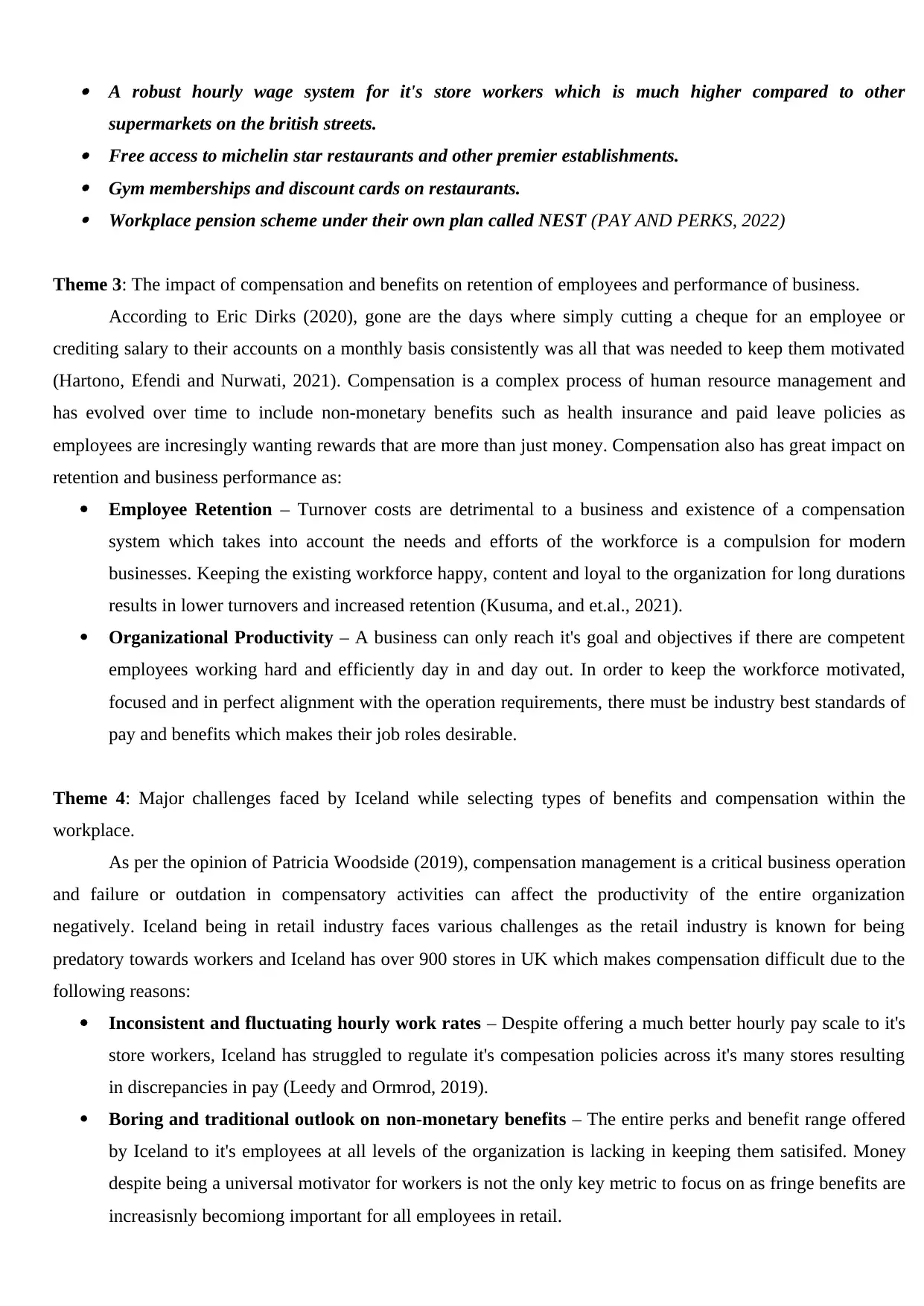
A robust hourly wage system for it's store workers which is much higher compared to other
supermarkets on the british streets.
Free access to michelin star restaurants and other premier establishments.
Gym memberships and discount cards on restaurants.
Workplace pension scheme under their own plan called NEST (PAY AND PERKS, 2022)
Theme 3: The impact of compensation and benefits on retention of employees and performance of business.
According to Eric Dirks (2020), gone are the days where simply cutting a cheque for an employee or
crediting salary to their accounts on a monthly basis consistently was all that was needed to keep them motivated
(Hartono, Efendi and Nurwati, 2021). Compensation is a complex process of human resource management and
has evolved over time to include non-monetary benefits such as health insurance and paid leave policies as
employees are incresingly wanting rewards that are more than just money. Compensation also has great impact on
retention and business performance as:
Employee Retention – Turnover costs are detrimental to a business and existence of a compensation
system which takes into account the needs and efforts of the workforce is a compulsion for modern
businesses. Keeping the existing workforce happy, content and loyal to the organization for long durations
results in lower turnovers and increased retention (Kusuma, and et.al., 2021).
Organizational Productivity – A business can only reach it's goal and objectives if there are competent
employees working hard and efficiently day in and day out. In order to keep the workforce motivated,
focused and in perfect alignment with the operation requirements, there must be industry best standards of
pay and benefits which makes their job roles desirable.
Theme 4: Major challenges faced by Iceland while selecting types of benefits and compensation within the
workplace.
As per the opinion of Patricia Woodside (2019), compensation management is a critical business operation
and failure or outdation in compensatory activities can affect the productivity of the entire organization
negatively. Iceland being in retail industry faces various challenges as the retail industry is known for being
predatory towards workers and Iceland has over 900 stores in UK which makes compensation difficult due to the
following reasons:
Inconsistent and fluctuating hourly work rates – Despite offering a much better hourly pay scale to it's
store workers, Iceland has struggled to regulate it's compesation policies across it's many stores resulting
in discrepancies in pay (Leedy and Ormrod, 2019).
Boring and traditional outlook on non-monetary benefits – The entire perks and benefit range offered
by Iceland to it's employees at all levels of the organization is lacking in keeping them satisifed. Money
despite being a universal motivator for workers is not the only key metric to focus on as fringe benefits are
increasisnly becomiong important for all employees in retail.
supermarkets on the british streets.
Free access to michelin star restaurants and other premier establishments.
Gym memberships and discount cards on restaurants.
Workplace pension scheme under their own plan called NEST (PAY AND PERKS, 2022)
Theme 3: The impact of compensation and benefits on retention of employees and performance of business.
According to Eric Dirks (2020), gone are the days where simply cutting a cheque for an employee or
crediting salary to their accounts on a monthly basis consistently was all that was needed to keep them motivated
(Hartono, Efendi and Nurwati, 2021). Compensation is a complex process of human resource management and
has evolved over time to include non-monetary benefits such as health insurance and paid leave policies as
employees are incresingly wanting rewards that are more than just money. Compensation also has great impact on
retention and business performance as:
Employee Retention – Turnover costs are detrimental to a business and existence of a compensation
system which takes into account the needs and efforts of the workforce is a compulsion for modern
businesses. Keeping the existing workforce happy, content and loyal to the organization for long durations
results in lower turnovers and increased retention (Kusuma, and et.al., 2021).
Organizational Productivity – A business can only reach it's goal and objectives if there are competent
employees working hard and efficiently day in and day out. In order to keep the workforce motivated,
focused and in perfect alignment with the operation requirements, there must be industry best standards of
pay and benefits which makes their job roles desirable.
Theme 4: Major challenges faced by Iceland while selecting types of benefits and compensation within the
workplace.
As per the opinion of Patricia Woodside (2019), compensation management is a critical business operation
and failure or outdation in compensatory activities can affect the productivity of the entire organization
negatively. Iceland being in retail industry faces various challenges as the retail industry is known for being
predatory towards workers and Iceland has over 900 stores in UK which makes compensation difficult due to the
following reasons:
Inconsistent and fluctuating hourly work rates – Despite offering a much better hourly pay scale to it's
store workers, Iceland has struggled to regulate it's compesation policies across it's many stores resulting
in discrepancies in pay (Leedy and Ormrod, 2019).
Boring and traditional outlook on non-monetary benefits – The entire perks and benefit range offered
by Iceland to it's employees at all levels of the organization is lacking in keeping them satisifed. Money
despite being a universal motivator for workers is not the only key metric to focus on as fringe benefits are
increasisnly becomiong important for all employees in retail.
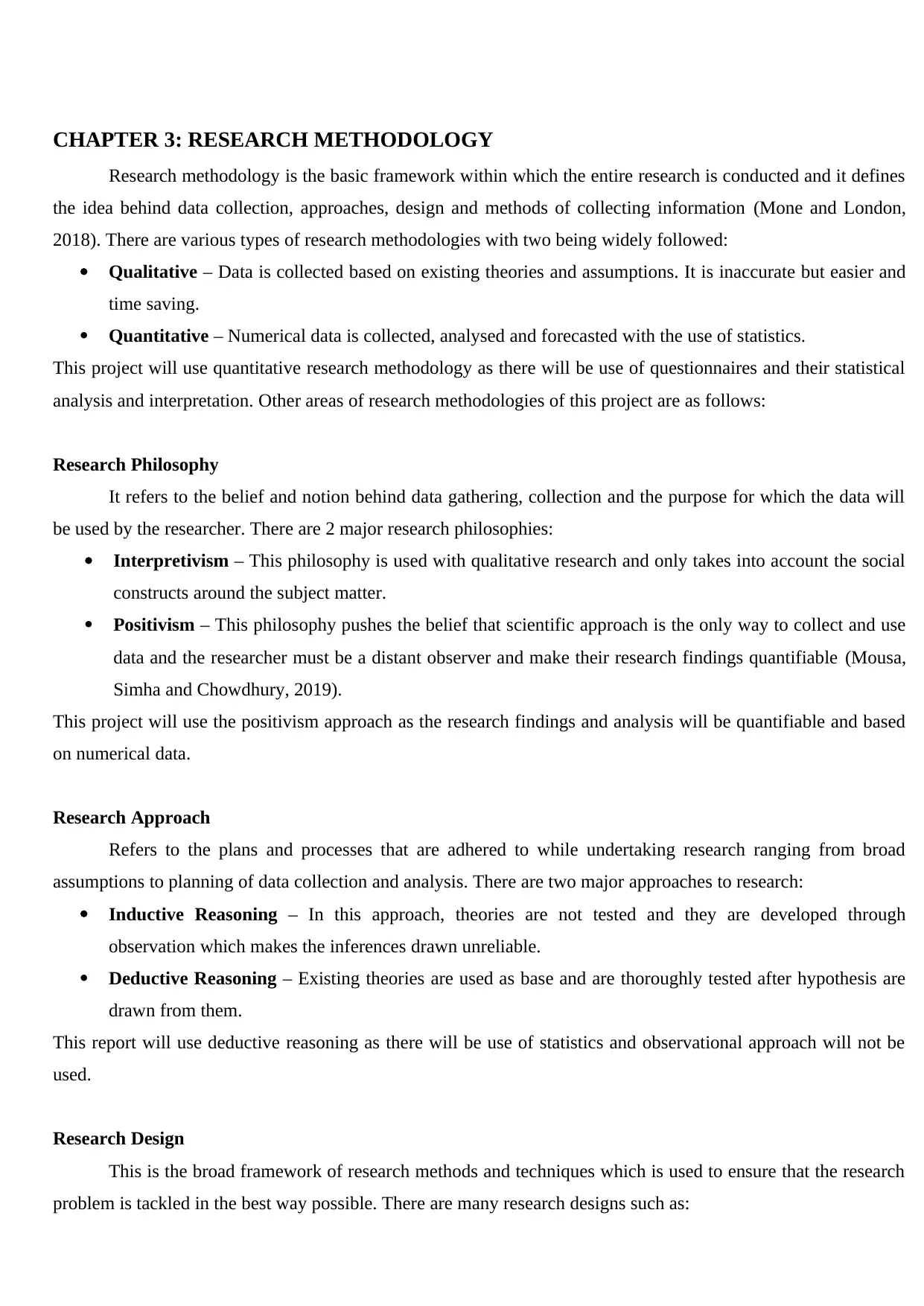
CHAPTER 3: RESEARCH METHODOLOGY
Research methodology is the basic framework within which the entire research is conducted and it defines
the idea behind data collection, approaches, design and methods of collecting information (Mone and London,
2018). There are various types of research methodologies with two being widely followed:
Qualitative – Data is collected based on existing theories and assumptions. It is inaccurate but easier and
time saving.
Quantitative – Numerical data is collected, analysed and forecasted with the use of statistics.
This project will use quantitative research methodology as there will be use of questionnaires and their statistical
analysis and interpretation. Other areas of research methodologies of this project are as follows:
Research Philosophy
It refers to the belief and notion behind data gathering, collection and the purpose for which the data will
be used by the researcher. There are 2 major research philosophies:
Interpretivism – This philosophy is used with qualitative research and only takes into account the social
constructs around the subject matter.
Positivism – This philosophy pushes the belief that scientific approach is the only way to collect and use
data and the researcher must be a distant observer and make their research findings quantifiable (Mousa,
Simha and Chowdhury, 2019).
This project will use the positivism approach as the research findings and analysis will be quantifiable and based
on numerical data.
Research Approach
Refers to the plans and processes that are adhered to while undertaking research ranging from broad
assumptions to planning of data collection and analysis. There are two major approaches to research:
Inductive Reasoning – In this approach, theories are not tested and they are developed through
observation which makes the inferences drawn unreliable.
Deductive Reasoning – Existing theories are used as base and are thoroughly tested after hypothesis are
drawn from them.
This report will use deductive reasoning as there will be use of statistics and observational approach will not be
used.
Research Design
This is the broad framework of research methods and techniques which is used to ensure that the research
problem is tackled in the best way possible. There are many research designs such as:
Research methodology is the basic framework within which the entire research is conducted and it defines
the idea behind data collection, approaches, design and methods of collecting information (Mone and London,
2018). There are various types of research methodologies with two being widely followed:
Qualitative – Data is collected based on existing theories and assumptions. It is inaccurate but easier and
time saving.
Quantitative – Numerical data is collected, analysed and forecasted with the use of statistics.
This project will use quantitative research methodology as there will be use of questionnaires and their statistical
analysis and interpretation. Other areas of research methodologies of this project are as follows:
Research Philosophy
It refers to the belief and notion behind data gathering, collection and the purpose for which the data will
be used by the researcher. There are 2 major research philosophies:
Interpretivism – This philosophy is used with qualitative research and only takes into account the social
constructs around the subject matter.
Positivism – This philosophy pushes the belief that scientific approach is the only way to collect and use
data and the researcher must be a distant observer and make their research findings quantifiable (Mousa,
Simha and Chowdhury, 2019).
This project will use the positivism approach as the research findings and analysis will be quantifiable and based
on numerical data.
Research Approach
Refers to the plans and processes that are adhered to while undertaking research ranging from broad
assumptions to planning of data collection and analysis. There are two major approaches to research:
Inductive Reasoning – In this approach, theories are not tested and they are developed through
observation which makes the inferences drawn unreliable.
Deductive Reasoning – Existing theories are used as base and are thoroughly tested after hypothesis are
drawn from them.
This report will use deductive reasoning as there will be use of statistics and observational approach will not be
used.
Research Design
This is the broad framework of research methods and techniques which is used to ensure that the research
problem is tackled in the best way possible. There are many research designs such as:
⊘ This is a preview!⊘
Do you want full access?
Subscribe today to unlock all pages.

Trusted by 1+ million students worldwide
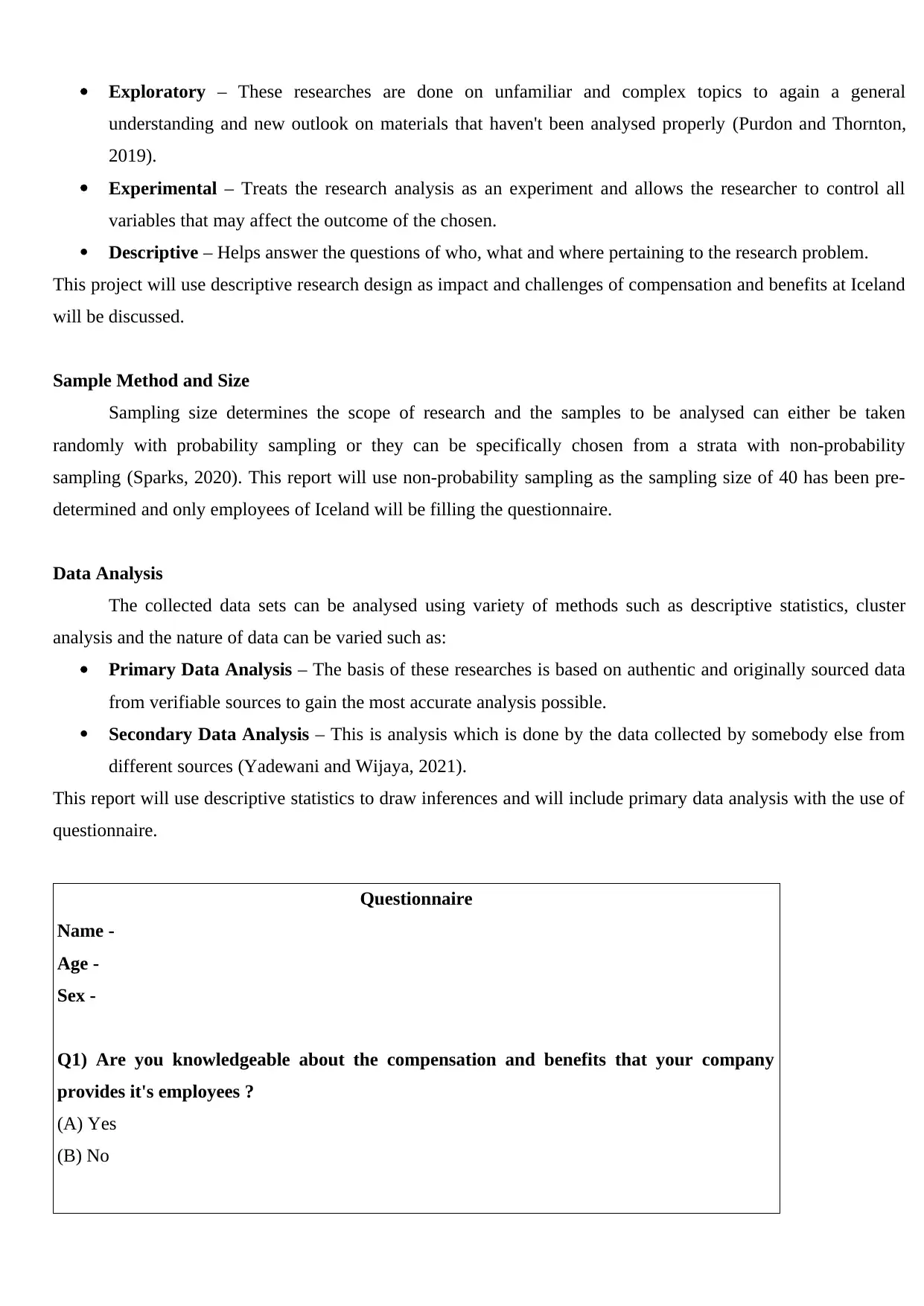
Exploratory – These researches are done on unfamiliar and complex topics to again a general
understanding and new outlook on materials that haven't been analysed properly (Purdon and Thornton,
2019).
Experimental – Treats the research analysis as an experiment and allows the researcher to control all
variables that may affect the outcome of the chosen.
Descriptive – Helps answer the questions of who, what and where pertaining to the research problem.
This project will use descriptive research design as impact and challenges of compensation and benefits at Iceland
will be discussed.
Sample Method and Size
Sampling size determines the scope of research and the samples to be analysed can either be taken
randomly with probability sampling or they can be specifically chosen from a strata with non-probability
sampling (Sparks, 2020). This report will use non-probability sampling as the sampling size of 40 has been pre-
determined and only employees of Iceland will be filling the questionnaire.
Data Analysis
The collected data sets can be analysed using variety of methods such as descriptive statistics, cluster
analysis and the nature of data can be varied such as:
Primary Data Analysis – The basis of these researches is based on authentic and originally sourced data
from verifiable sources to gain the most accurate analysis possible.
Secondary Data Analysis – This is analysis which is done by the data collected by somebody else from
different sources (Yadewani and Wijaya, 2021).
This report will use descriptive statistics to draw inferences and will include primary data analysis with the use of
questionnaire.
Questionnaire
Name -
Age -
Sex -
Q1) Are you knowledgeable about the compensation and benefits that your company
provides it's employees ?
(A) Yes
(B) No
understanding and new outlook on materials that haven't been analysed properly (Purdon and Thornton,
2019).
Experimental – Treats the research analysis as an experiment and allows the researcher to control all
variables that may affect the outcome of the chosen.
Descriptive – Helps answer the questions of who, what and where pertaining to the research problem.
This project will use descriptive research design as impact and challenges of compensation and benefits at Iceland
will be discussed.
Sample Method and Size
Sampling size determines the scope of research and the samples to be analysed can either be taken
randomly with probability sampling or they can be specifically chosen from a strata with non-probability
sampling (Sparks, 2020). This report will use non-probability sampling as the sampling size of 40 has been pre-
determined and only employees of Iceland will be filling the questionnaire.
Data Analysis
The collected data sets can be analysed using variety of methods such as descriptive statistics, cluster
analysis and the nature of data can be varied such as:
Primary Data Analysis – The basis of these researches is based on authentic and originally sourced data
from verifiable sources to gain the most accurate analysis possible.
Secondary Data Analysis – This is analysis which is done by the data collected by somebody else from
different sources (Yadewani and Wijaya, 2021).
This report will use descriptive statistics to draw inferences and will include primary data analysis with the use of
questionnaire.
Questionnaire
Name -
Age -
Sex -
Q1) Are you knowledgeable about the compensation and benefits that your company
provides it's employees ?
(A) Yes
(B) No
Paraphrase This Document
Need a fresh take? Get an instant paraphrase of this document with our AI Paraphraser
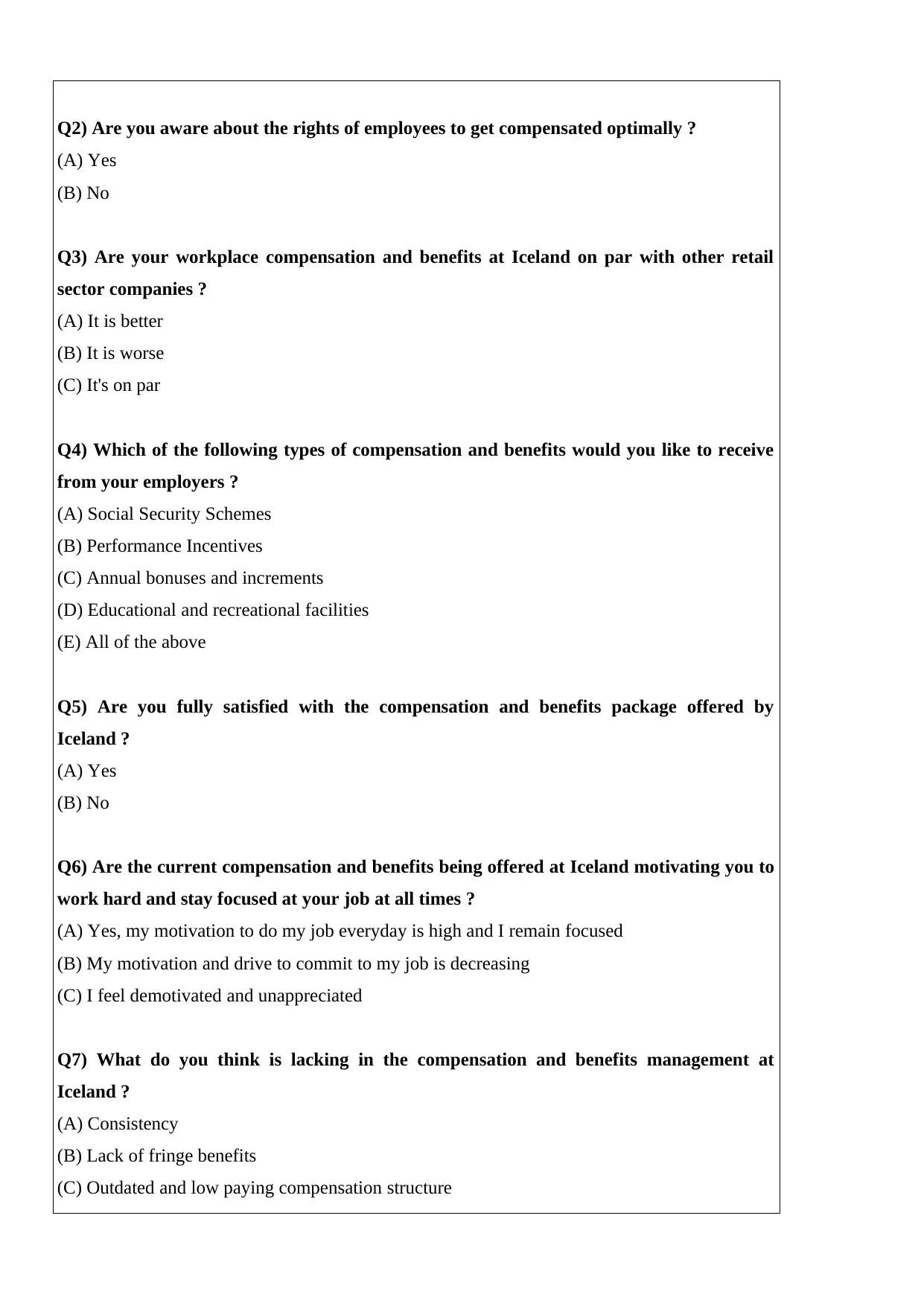
Q2) Are you aware about the rights of employees to get compensated optimally ?
(A) Yes
(B) No
Q3) Are your workplace compensation and benefits at Iceland on par with other retail
sector companies ?
(A) It is better
(B) It is worse
(C) It's on par
Q4) Which of the following types of compensation and benefits would you like to receive
from your employers ?
(A) Social Security Schemes
(B) Performance Incentives
(C) Annual bonuses and increments
(D) Educational and recreational facilities
(E) All of the above
Q5) Are you fully satisfied with the compensation and benefits package offered by
Iceland ?
(A) Yes
(B) No
Q6) Are the current compensation and benefits being offered at Iceland motivating you to
work hard and stay focused at your job at all times ?
(A) Yes, my motivation to do my job everyday is high and I remain focused
(B) My motivation and drive to commit to my job is decreasing
(C) I feel demotivated and unappreciated
Q7) What do you think is lacking in the compensation and benefits management at
Iceland ?
(A) Consistency
(B) Lack of fringe benefits
(C) Outdated and low paying compensation structure
(A) Yes
(B) No
Q3) Are your workplace compensation and benefits at Iceland on par with other retail
sector companies ?
(A) It is better
(B) It is worse
(C) It's on par
Q4) Which of the following types of compensation and benefits would you like to receive
from your employers ?
(A) Social Security Schemes
(B) Performance Incentives
(C) Annual bonuses and increments
(D) Educational and recreational facilities
(E) All of the above
Q5) Are you fully satisfied with the compensation and benefits package offered by
Iceland ?
(A) Yes
(B) No
Q6) Are the current compensation and benefits being offered at Iceland motivating you to
work hard and stay focused at your job at all times ?
(A) Yes, my motivation to do my job everyday is high and I remain focused
(B) My motivation and drive to commit to my job is decreasing
(C) I feel demotivated and unappreciated
Q7) What do you think is lacking in the compensation and benefits management at
Iceland ?
(A) Consistency
(B) Lack of fringe benefits
(C) Outdated and low paying compensation structure
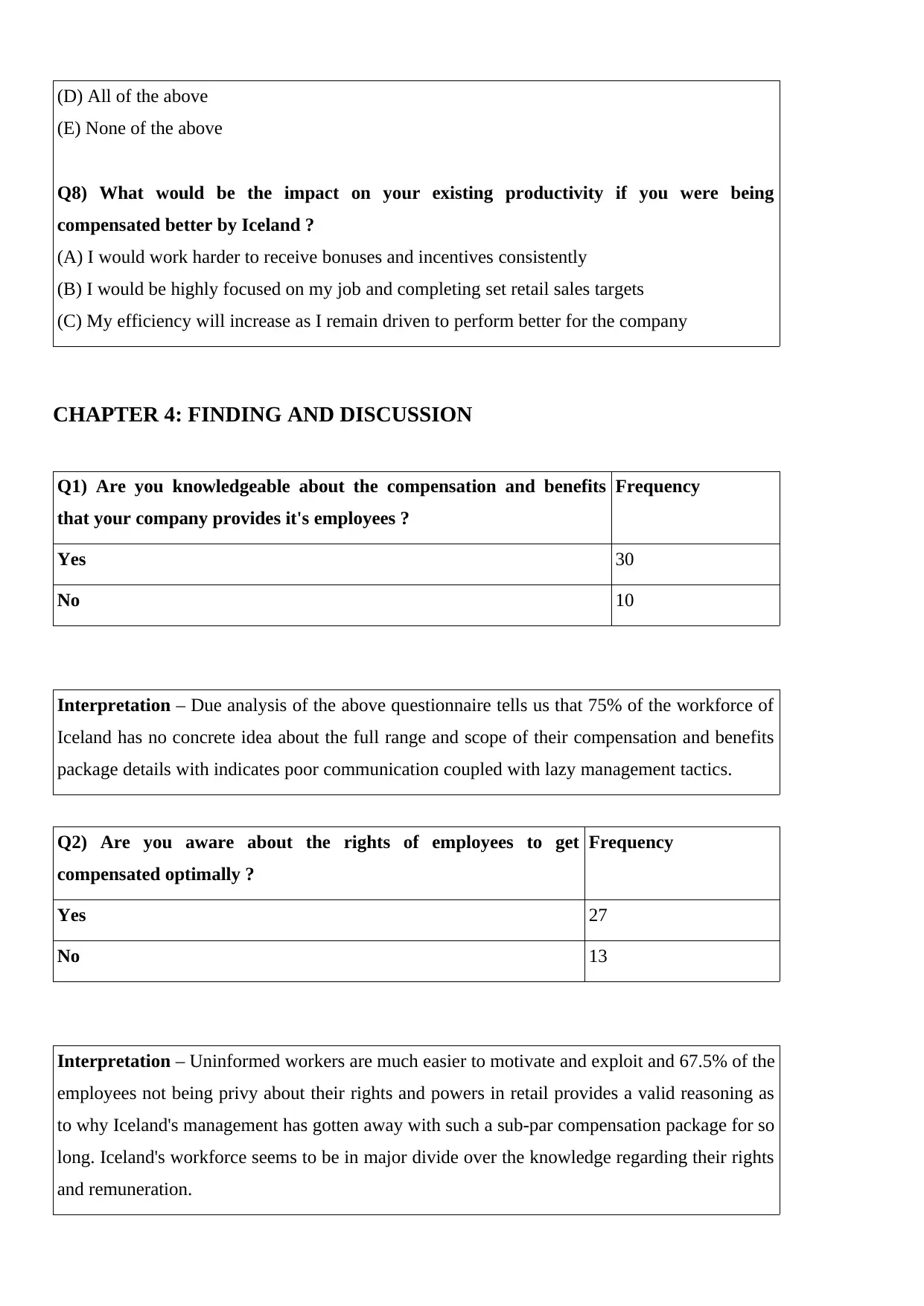
(D) All of the above
(E) None of the above
Q8) What would be the impact on your existing productivity if you were being
compensated better by Iceland ?
(A) I would work harder to receive bonuses and incentives consistently
(B) I would be highly focused on my job and completing set retail sales targets
(C) My efficiency will increase as I remain driven to perform better for the company
CHAPTER 4: FINDING AND DISCUSSION
Q1) Are you knowledgeable about the compensation and benefits
that your company provides it's employees ?
Frequency
Yes 30
No 10
Interpretation – Due analysis of the above questionnaire tells us that 75% of the workforce of
Iceland has no concrete idea about the full range and scope of their compensation and benefits
package details with indicates poor communication coupled with lazy management tactics.
Q2) Are you aware about the rights of employees to get
compensated optimally ?
Frequency
Yes 27
No 13
Interpretation – Uninformed workers are much easier to motivate and exploit and 67.5% of the
employees not being privy about their rights and powers in retail provides a valid reasoning as
to why Iceland's management has gotten away with such a sub-par compensation package for so
long. Iceland's workforce seems to be in major divide over the knowledge regarding their rights
and remuneration.
(E) None of the above
Q8) What would be the impact on your existing productivity if you were being
compensated better by Iceland ?
(A) I would work harder to receive bonuses and incentives consistently
(B) I would be highly focused on my job and completing set retail sales targets
(C) My efficiency will increase as I remain driven to perform better for the company
CHAPTER 4: FINDING AND DISCUSSION
Q1) Are you knowledgeable about the compensation and benefits
that your company provides it's employees ?
Frequency
Yes 30
No 10
Interpretation – Due analysis of the above questionnaire tells us that 75% of the workforce of
Iceland has no concrete idea about the full range and scope of their compensation and benefits
package details with indicates poor communication coupled with lazy management tactics.
Q2) Are you aware about the rights of employees to get
compensated optimally ?
Frequency
Yes 27
No 13
Interpretation – Uninformed workers are much easier to motivate and exploit and 67.5% of the
employees not being privy about their rights and powers in retail provides a valid reasoning as
to why Iceland's management has gotten away with such a sub-par compensation package for so
long. Iceland's workforce seems to be in major divide over the knowledge regarding their rights
and remuneration.
⊘ This is a preview!⊘
Do you want full access?
Subscribe today to unlock all pages.

Trusted by 1+ million students worldwide
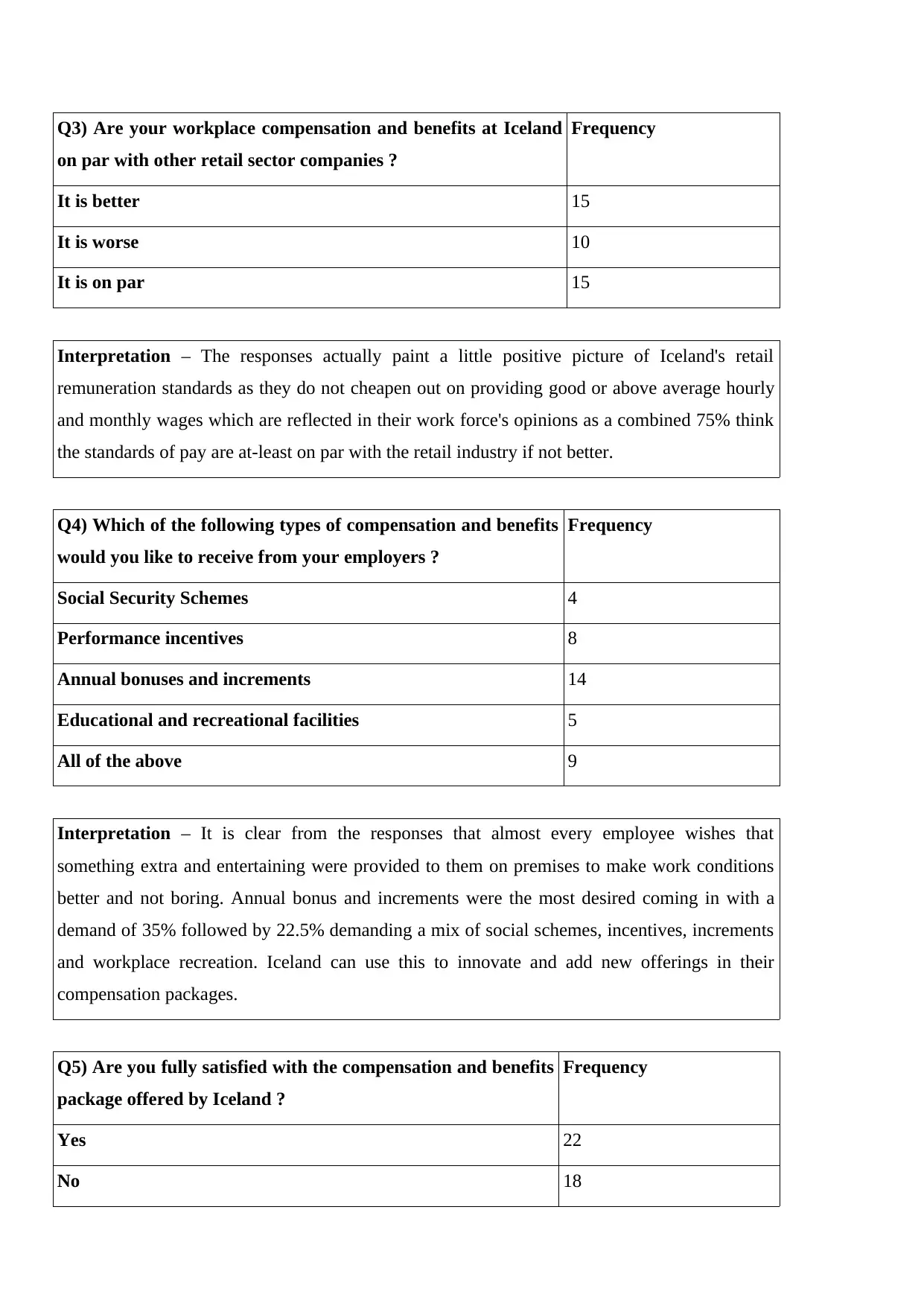
Q3) Are your workplace compensation and benefits at Iceland
on par with other retail sector companies ?
Frequency
It is better 15
It is worse 10
It is on par 15
Interpretation – The responses actually paint a little positive picture of Iceland's retail
remuneration standards as they do not cheapen out on providing good or above average hourly
and monthly wages which are reflected in their work force's opinions as a combined 75% think
the standards of pay are at-least on par with the retail industry if not better.
Q4) Which of the following types of compensation and benefits
would you like to receive from your employers ?
Frequency
Social Security Schemes 4
Performance incentives 8
Annual bonuses and increments 14
Educational and recreational facilities 5
All of the above 9
Interpretation – It is clear from the responses that almost every employee wishes that
something extra and entertaining were provided to them on premises to make work conditions
better and not boring. Annual bonus and increments were the most desired coming in with a
demand of 35% followed by 22.5% demanding a mix of social schemes, incentives, increments
and workplace recreation. Iceland can use this to innovate and add new offerings in their
compensation packages.
Q5) Are you fully satisfied with the compensation and benefits
package offered by Iceland ?
Frequency
Yes 22
No 18
on par with other retail sector companies ?
Frequency
It is better 15
It is worse 10
It is on par 15
Interpretation – The responses actually paint a little positive picture of Iceland's retail
remuneration standards as they do not cheapen out on providing good or above average hourly
and monthly wages which are reflected in their work force's opinions as a combined 75% think
the standards of pay are at-least on par with the retail industry if not better.
Q4) Which of the following types of compensation and benefits
would you like to receive from your employers ?
Frequency
Social Security Schemes 4
Performance incentives 8
Annual bonuses and increments 14
Educational and recreational facilities 5
All of the above 9
Interpretation – It is clear from the responses that almost every employee wishes that
something extra and entertaining were provided to them on premises to make work conditions
better and not boring. Annual bonus and increments were the most desired coming in with a
demand of 35% followed by 22.5% demanding a mix of social schemes, incentives, increments
and workplace recreation. Iceland can use this to innovate and add new offerings in their
compensation packages.
Q5) Are you fully satisfied with the compensation and benefits
package offered by Iceland ?
Frequency
Yes 22
No 18
Paraphrase This Document
Need a fresh take? Get an instant paraphrase of this document with our AI Paraphraser
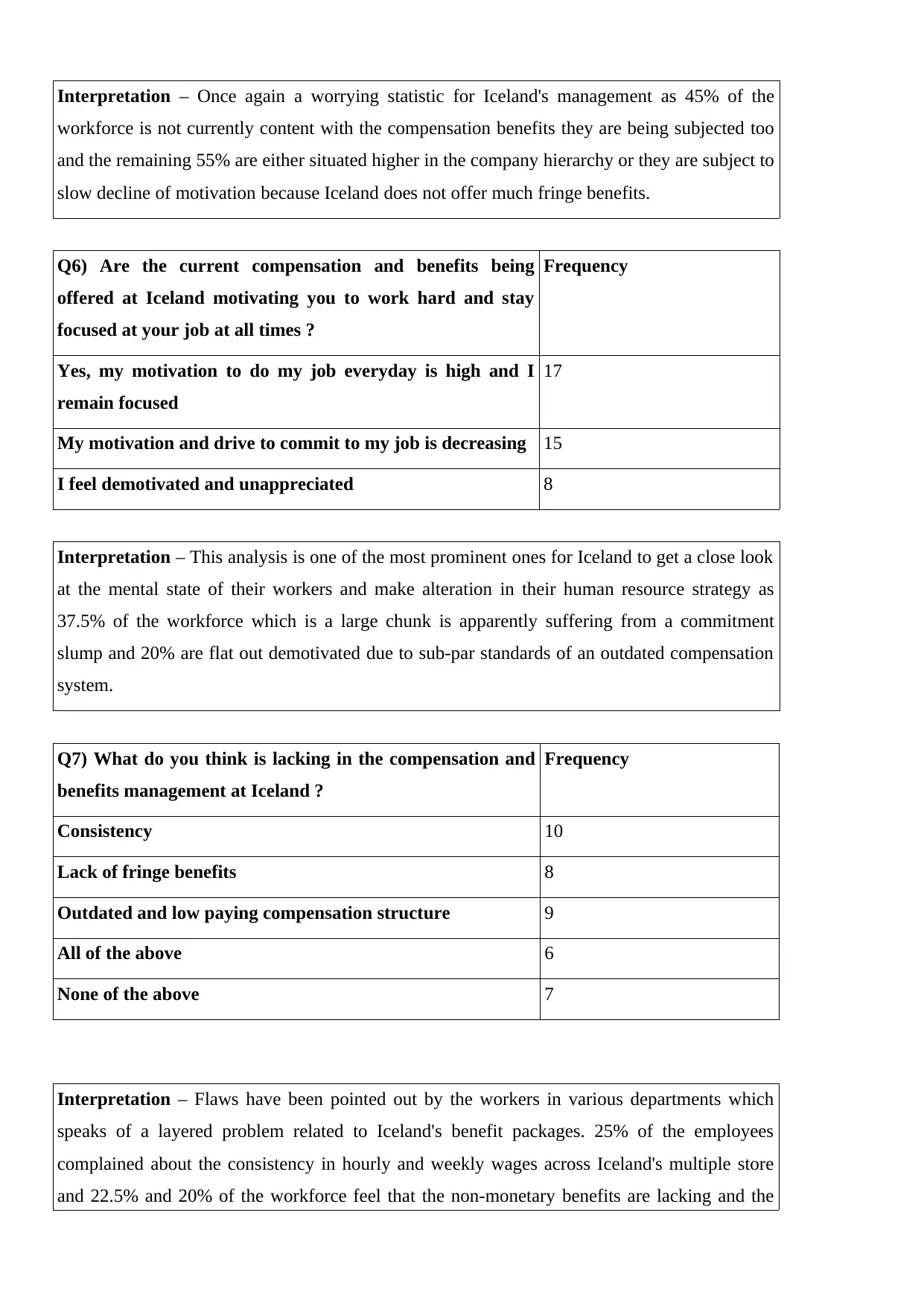
Interpretation – Once again a worrying statistic for Iceland's management as 45% of the
workforce is not currently content with the compensation benefits they are being subjected too
and the remaining 55% are either situated higher in the company hierarchy or they are subject to
slow decline of motivation because Iceland does not offer much fringe benefits.
Q6) Are the current compensation and benefits being
offered at Iceland motivating you to work hard and stay
focused at your job at all times ?
Frequency
Yes, my motivation to do my job everyday is high and I
remain focused
17
My motivation and drive to commit to my job is decreasing 15
I feel demotivated and unappreciated 8
Interpretation – This analysis is one of the most prominent ones for Iceland to get a close look
at the mental state of their workers and make alteration in their human resource strategy as
37.5% of the workforce which is a large chunk is apparently suffering from a commitment
slump and 20% are flat out demotivated due to sub-par standards of an outdated compensation
system.
Q7) What do you think is lacking in the compensation and
benefits management at Iceland ?
Frequency
Consistency 10
Lack of fringe benefits 8
Outdated and low paying compensation structure 9
All of the above 6
None of the above 7
Interpretation – Flaws have been pointed out by the workers in various departments which
speaks of a layered problem related to Iceland's benefit packages. 25% of the employees
complained about the consistency in hourly and weekly wages across Iceland's multiple store
and 22.5% and 20% of the workforce feel that the non-monetary benefits are lacking and the
workforce is not currently content with the compensation benefits they are being subjected too
and the remaining 55% are either situated higher in the company hierarchy or they are subject to
slow decline of motivation because Iceland does not offer much fringe benefits.
Q6) Are the current compensation and benefits being
offered at Iceland motivating you to work hard and stay
focused at your job at all times ?
Frequency
Yes, my motivation to do my job everyday is high and I
remain focused
17
My motivation and drive to commit to my job is decreasing 15
I feel demotivated and unappreciated 8
Interpretation – This analysis is one of the most prominent ones for Iceland to get a close look
at the mental state of their workers and make alteration in their human resource strategy as
37.5% of the workforce which is a large chunk is apparently suffering from a commitment
slump and 20% are flat out demotivated due to sub-par standards of an outdated compensation
system.
Q7) What do you think is lacking in the compensation and
benefits management at Iceland ?
Frequency
Consistency 10
Lack of fringe benefits 8
Outdated and low paying compensation structure 9
All of the above 6
None of the above 7
Interpretation – Flaws have been pointed out by the workers in various departments which
speaks of a layered problem related to Iceland's benefit packages. 25% of the employees
complained about the consistency in hourly and weekly wages across Iceland's multiple store
and 22.5% and 20% of the workforce feel that the non-monetary benefits are lacking and the
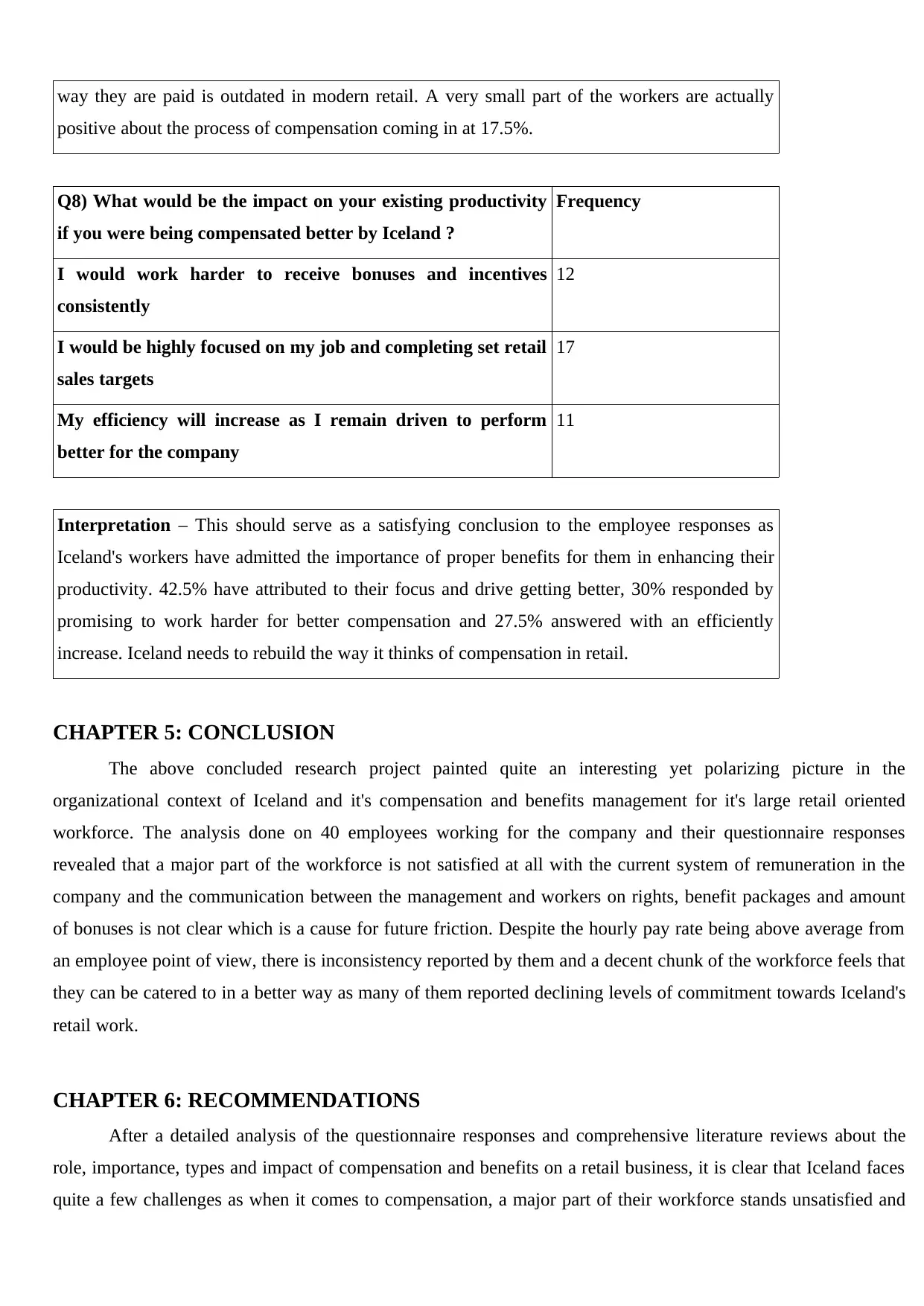
way they are paid is outdated in modern retail. A very small part of the workers are actually
positive about the process of compensation coming in at 17.5%.
Q8) What would be the impact on your existing productivity
if you were being compensated better by Iceland ?
Frequency
I would work harder to receive bonuses and incentives
consistently
12
I would be highly focused on my job and completing set retail
sales targets
17
My efficiency will increase as I remain driven to perform
better for the company
11
Interpretation – This should serve as a satisfying conclusion to the employee responses as
Iceland's workers have admitted the importance of proper benefits for them in enhancing their
productivity. 42.5% have attributed to their focus and drive getting better, 30% responded by
promising to work harder for better compensation and 27.5% answered with an efficiently
increase. Iceland needs to rebuild the way it thinks of compensation in retail.
CHAPTER 5: CONCLUSION
The above concluded research project painted quite an interesting yet polarizing picture in the
organizational context of Iceland and it's compensation and benefits management for it's large retail oriented
workforce. The analysis done on 40 employees working for the company and their questionnaire responses
revealed that a major part of the workforce is not satisfied at all with the current system of remuneration in the
company and the communication between the management and workers on rights, benefit packages and amount
of bonuses is not clear which is a cause for future friction. Despite the hourly pay rate being above average from
an employee point of view, there is inconsistency reported by them and a decent chunk of the workforce feels that
they can be catered to in a better way as many of them reported declining levels of commitment towards Iceland's
retail work.
CHAPTER 6: RECOMMENDATIONS
After a detailed analysis of the questionnaire responses and comprehensive literature reviews about the
role, importance, types and impact of compensation and benefits on a retail business, it is clear that Iceland faces
quite a few challenges as when it comes to compensation, a major part of their workforce stands unsatisfied and
positive about the process of compensation coming in at 17.5%.
Q8) What would be the impact on your existing productivity
if you were being compensated better by Iceland ?
Frequency
I would work harder to receive bonuses and incentives
consistently
12
I would be highly focused on my job and completing set retail
sales targets
17
My efficiency will increase as I remain driven to perform
better for the company
11
Interpretation – This should serve as a satisfying conclusion to the employee responses as
Iceland's workers have admitted the importance of proper benefits for them in enhancing their
productivity. 42.5% have attributed to their focus and drive getting better, 30% responded by
promising to work harder for better compensation and 27.5% answered with an efficiently
increase. Iceland needs to rebuild the way it thinks of compensation in retail.
CHAPTER 5: CONCLUSION
The above concluded research project painted quite an interesting yet polarizing picture in the
organizational context of Iceland and it's compensation and benefits management for it's large retail oriented
workforce. The analysis done on 40 employees working for the company and their questionnaire responses
revealed that a major part of the workforce is not satisfied at all with the current system of remuneration in the
company and the communication between the management and workers on rights, benefit packages and amount
of bonuses is not clear which is a cause for future friction. Despite the hourly pay rate being above average from
an employee point of view, there is inconsistency reported by them and a decent chunk of the workforce feels that
they can be catered to in a better way as many of them reported declining levels of commitment towards Iceland's
retail work.
CHAPTER 6: RECOMMENDATIONS
After a detailed analysis of the questionnaire responses and comprehensive literature reviews about the
role, importance, types and impact of compensation and benefits on a retail business, it is clear that Iceland faces
quite a few challenges as when it comes to compensation, a major part of their workforce stands unsatisfied and
⊘ This is a preview!⊘
Do you want full access?
Subscribe today to unlock all pages.

Trusted by 1+ million students worldwide
1 out of 21
Related Documents
Your All-in-One AI-Powered Toolkit for Academic Success.
+13062052269
info@desklib.com
Available 24*7 on WhatsApp / Email
![[object Object]](/_next/static/media/star-bottom.7253800d.svg)
Unlock your academic potential
© 2024 | Zucol Services PVT LTD | All rights reserved.




